
Our Lenten Banners
Each week throughout Lent, a banner is placed on one of the pillars in the sanctuary.
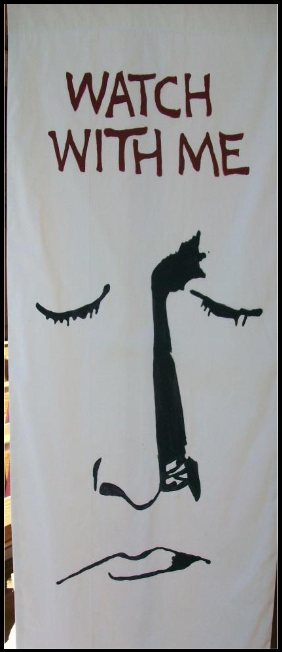 |
Matthew 26:38 The Passion journey first takes us across the Kidron Valley from Jerusalem to the slopes of the Mount of Olives, to a small orchard where olives were pressed to extract their oil. Hence comes the name Gethsemane, which means the garden of the oil press. Jesus came here often for prayer and restoration, but that night was different. He had come to these familiar surroundings for the last time, not to rest, but to prepare himself for his work of redemption. Upon entering the garden, eight of Jesus' disciples waited near the gate. Jesus with three disciples, James, John and Peter, went a little farther. Jesus was deep in thought, but after a few moments he spoke: " 'My soul is overwhelmed with sorrow to the point of death. Stay here and keep watch with me.' Going a little farther, he fell with his face to the ground and prayed, 'My Father, if it's possible, may this cup be taken from me. Yet not as I will, but as you will.' Then he returned to his disciples and found them sleeping. 'Could you men not keep watch with me for one hour?' he asked Peter. 'Watch and pray so that you will not fall into temptation.'" A second and a third time he went off to pray, and again found his disciples sleeping. "' Are you still sleeping and resting? Look, the hour is near, and the Son of Man is betrayed into the hands of sinners. Rise, let us go! Here comes my betrayer!'" Matthew 26:38-46 |
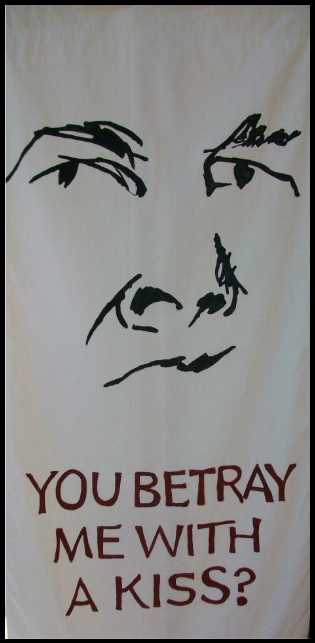 |
We return to the road leading from Jerusalem to the Mount of Olives. That night a large crowd armed with clubs and swords had gathered on the road, among them Judas, one of Jesus' disciples. Earlier that evening Judas had been with Jesus and his friends for the Passover meal. But Jesus, well aware of Judas's plans, after some very frank words dismissed Judas before he could finish eating. Judas had agreed to identify Jesus in the dark: "The one I kiss is the man; arrest him." The name Judas is synonymous with betrayal. Someone once said that if it weren't for Judas, the whole show would not have gone on in the first place. That statement shows a note of ignorance. The Jewish officials had already decided to rid themselves of Jesus and the controversy he presented. In their determination, they would have found a way to follow through on their plan. Judas, under the influence of Satan, came out of anonymity and made it easier. For 30 pieces of silver, the price of a slave, he lead them to the place where Jesus could be seized quietly. When he approached, Jesus asked him, "Judas, are you betraying the Son of Man with a kiss?" (Luke 22:48) During the next hour Judas watched as Jesus was shuttled from one period of questioning to another. His emotions raging with anger, remorse, and confusion, he returned the 30 pieces of silver to the chief priests. "I have sinned, for I have betrayed innocent blood" (Matthew 27:4). "I have sinned," he kept repeating to himself. In his mind there was only one way out. |
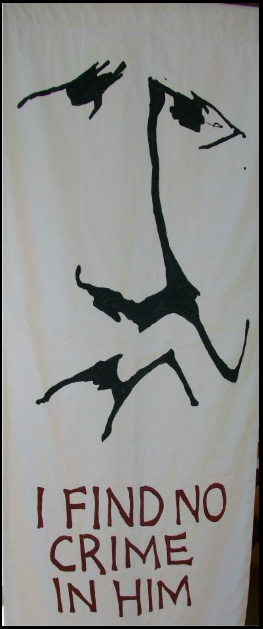 |
Now we enter the palace where early that Friday the Roman governor, Pontius Pilate, sat alone, pondering the fate of the itinerant teacher from Nazareth, Jesus. Nobody wanted anything to do with him, that was clear. The Jewish officials were impatient to get rid of him, though unwilling to handle the matter themselves. Pilate had earlier asked them to recount Jesus’ crimes, but they responded, “If he were not a criminal, we would not have handed him over to you.” Wanting to hand Jesus back to them, Pilate continued, “Take him yourselves and judge him by your own law.” They objected, “We have not right to execute anyone.” (John 18:30-31) Then there was the matter of that message had received from his wife: “Don’t have anything to do with that innocent man, for I have suffered a great deal today in a dream because of him.” (Matthew 27:19) Through all of this Jesus had said nothing to indict himself. Finally, Pilate reached a decision, of sorts. It was customary every year at Passover to release a prisoner. “I’ll give them a choice between Jesus and the convicted insurrectionist and murderer, Barabbas. Surely they will pick Jesus,” thought Pilate, “and I can wash my hands of this whole affair.” Of course, it didn’t turn out like that. |
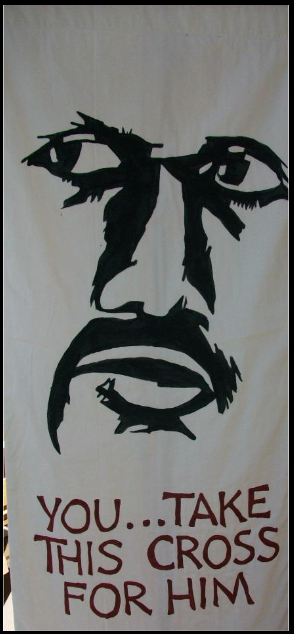 |
We return to the road leading from Jerusalem to the Mount of Olives. That night a large crowd armed with clubs and swords had gathered on the road, among them Judas, one of Jesus' disciples. Earlier that evening Judas had been with Jesus and his friends for the Passover meal. But Jesus, well aware of Judas's plans, after some very frank words dismissed Judas before he could finish eating. Judas had agreed to identify Jesus in the dark: "The one I kiss is the man; arrest him." By camel or on foot, Simon, a devout Jew from Cyrene on the north coast of Africa, had made the long journey to Jerusalem to attend the Feast of the Passover. We can only guess his thoughts upon arriving. No doubt he recalled the psalmist's description of the city: "It is beautiful in its loftiness, the joy of the whole earth" (Psalm 48:2), as he eagerly anticipated his visit to the temple. Upon entering the city, Simon noticed a procession from one of the city gates. Curiosity drew him nearer, to see three men straining under the 30 or 40 pounds of wooden beams across their shoulders. Yet another crucifixion! Placards carried by soldiers announced their crimes. One placard, carried in front of a man wearing a crown of thorns on his head, read simply, "King of the Jews." Simon watched this "king" struggle under his burden. He looked weak and his back was whipped to a bloody pulp! Apparently the office in charge did not believe that this "king," Jesus, could carry his beam all the way to their destination. "You there! Take his place," the soldier called. Simon searched the crowd around him, thinking, "Who's he calling?" The soldier grabbed Simon and said gruffly, "You, carry this cross for him." Dark thoughts raced through Simon's mind. "Why me? The humiliation! To come here and be treated like the worst kind of criminal. What have I done to deserve this?" But he simply had no choice. It was God's will, too, that he bear our Savior's cross. Over the last 20 centuries many a pilgrim has looked at Simon with envy while remembering Jesus' words, "If anyone would come after me, he must deny himself and take up his cross and follow me." (Matthew 16:24) Simon was privileged. He had been accorded the greatest of honors! "I have sinned, for I have betrayed innocent blood" (Matthew 27:4). |
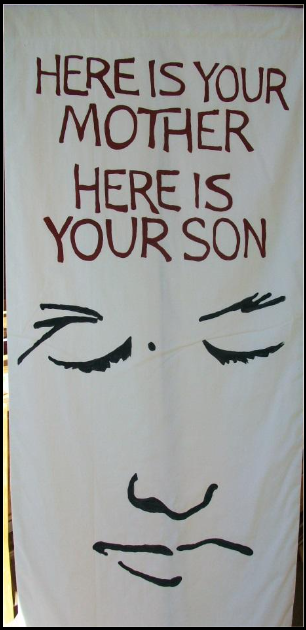 |
Finally, we stand at the skull-shaped hill along one of the roads leading away from Jerusalem. In Latin, it was called Calvary; in Aramaic, Golgotha. Three men hung from crosses that Friday. The sight was so commonplace that passers by hardly seemed to notice. There was not much anyone could do for them anyhow, except to take pity on them and curse the Romans. A small group was keeping vigil there at Calvary. Among them were one of Jesus' disciples and several women, including Jesus' mother. You can imagine her thoughts as she watched her Son struggling to breathe. She saw the lifeblood literally drain from his body. If only his ordeal would end quickly. Jesus saw his mother standing nearby and spoke to her. "Dear woman, here is your son," he said, referring to the disciple, John. To the disciple he said, "Here is your mother." (John 19:26-27) Even as he died, Jesus' compassion for the plight of others was evident. |
Return to top